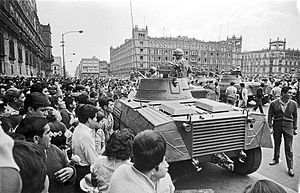| Mexican Movement of 1968 | |
|---|---|
| Part of Protests of 1968 and Mexican Dirty War | |
 Armored cars at the "Zócalo" in Mexico City in 1968 | |
| Date | 26 July 1968 – 2 October 1968 |
| Location | |
| Caused by | |
| Goals | Democratic changes, civil liberties, freedom for political prisoners |
| Methods | Student strike, demonstrations, assemblies, social organization |
| Resulted in |
|
The Mexican Movement of 1968, also known as the Mexican Student Movement (Movimiento Estudiantil) was a social movement composed of a broad coalition of students from Mexico's leading universities that garnered widespread public support for political change in Mexico. A major factor in its emergence publicly was the Mexican government's lavish spending to build Olympic facilities for the 1968 Olympics in Mexico City. The movement demanded greater political freedoms and an end to the authoritarianism of the PRI regime, which had been in power since 1929.
Student mobilization on the campuses of the National Autonomous University of Mexico, National Polytechnic Institute, El Colegio de México, Chapingo Autonomous University, Ibero-American University, Universidad La Salle and Meritorious Autonomous University of Puebla, among others created the National Strike Council. Its efforts to mobilize Mexican people for broad changes in national life was supported by many sectors of Mexican civil society, including workers, peasants, housewives, merchants, intellectuals, artists, and teachers.
The movement had a list of demands for Mexican president Gustavo Díaz Ordaz and the government of Mexico for specific student issues as well as broader ones, especially the reduction or elimination of authoritarianism. Simultaneous with the movement in Mexico and influencing it were global protests of 1968. Demands in Mexico were for a democratic change in the country, more political and civil liberties, the reduction of inequality and the resignation of the government of the ruling Institutional Revolutionary Party (PRI) that they considered authoritarian and by then had governed Mexico since 1929, with only weak political opposition.
The political movement was violently suppressed by the government following a series of mass demonstrations and culminating in a massacre of participants in a peaceful demonstration on 2 October 1968, known as the Tlatelolco massacre. There were lasting changes in Mexican political and cultural life because of the 1968 mobilization.[1]
- ^ Jesús Vargas Valdez "Student Movement of 1968" in Encyclopedia of Mexico, Chicago: Fitzroy Dearborn 1997, pages 1379-1382